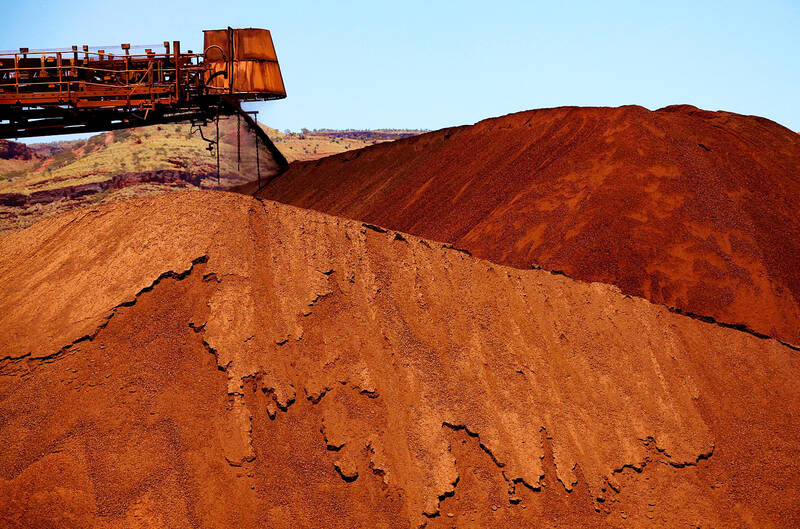Pilbara Minerals Ltd, one of Australia’s biggest lithium producers, plans to build a demonstration plant in Western Australia capable of refining the material that is key to the booming global battery metals market.
The pilot plant would process Pilbara Minerals’ hard rock ore into lithium salt near the company’s Pilgangoora Project in Western Australia, in a joint venture with Australia’s Calix Ltd that uses the latter’s patented “calcination” technology.
It is part of a push by Canberra to boost the country’s onshore lithium refining industry, responding to demand from automakers in the US and Europe for battery metals that bypass China.

Photo: REUTERS
Australia is the world’s biggest producer of the metal with almost half global supply, but currently exports no refined lithium chemicals.
A growing number of lithium producers are moving into refining in Australia, including US company Albemarle Corp, China’s Tianqi Lithium Corp (天齊鋰業) and Australia’s Wesfarmers Ltd. Most aim to produce battery-grade lithium hydroxide, which could be sold to battery manufacturers ready to use, but none are yet operating at commercial scale.
Pilbara Minerals plans to manufacture a less refined, easier to produce chemical that would be more durable than lithium hydroxide, but would need further processing before it could be used in batteries.
A final investment decision on the demonstration plant is targeted for the first half of next year, the two companies said in a joint regulatory filing yesterday, adding that they were in discussions with the Australian government for a A$20 million (US$13.4 million) grant.
If successful, the technology could be scaled up to commercial levels and potentially licensed to third parties, they said.
Australian Treasurer Jim Chalmers has asked the country’s Treasury to work with the Australian Foreign Investment Review Board and other stakeholders to undertake a review of foreign investment in sectors such as lithium and rare earths, Bloomberg reported last week.
Australia’s latest move adds to a broader push against China’s dominance of battery metals and renewable energy technology following moves by US President Joe Biden aimed at limiting the nation’s influence on key supply chains.
Canada last month strengthened its rules around foreign investments in the sector and ordered three Chinese firms to sell their stakes in a trio of lithium explorers.

Nvidia Corp chief executive officer Jensen Huang (黃仁勳) on Monday introduced the company’s latest supercomputer platform, featuring six new chips made by Taiwan Semiconductor Manufacturing Co (TSMC, 台積電), saying that it is now “in full production.” “If Vera Rubin is going to be in time for this year, it must be in production by now, and so, today I can tell you that Vera Rubin is in full production,” Huang said during his keynote speech at CES in Las Vegas. The rollout of six concurrent chips for Vera Rubin — the company’s next-generation artificial intelligence (AI) computing platform — marks a strategic

REVENUE PERFORMANCE: Cloud and network products, and electronic components saw strong increases, while smart consumer electronics and computing products fell Hon Hai Precision Industry Co (鴻海精密) yesterday posted 26.51 percent quarterly growth in revenue for last quarter to NT$2.6 trillion (US$82.44 billion), the strongest on record for the period and above expectations, but the company forecast a slight revenue dip this quarter due to seasonal factors. On an annual basis, revenue last quarter grew 22.07 percent, the company said. Analysts on average estimated about NT$2.4 trillion increase. Hon Hai, which assembles servers for Nvidia Corp and iPhones for Apple Inc, is expanding its capacity in the US, adding artificial intelligence (AI) server production in Wisconsin and Texas, where it operates established campuses. This

Garment maker Makalot Industrial Co (聚陽) yesterday reported lower-than-expected fourth-quarter revenue of NT$7.93 billion (US$251.44 million), down 9.48 percent from NT$8.76 billion a year earlier. On a quarterly basis, revenue fell 10.83 percent from NT$8.89 billion, company data showed. The figure was also lower than market expectations of NT$8.05 billion, according to data compiled by Yuanta Securities Investment and Consulting Co (元大投顧), which had projected NT$8.22 billion. Makalot’s revenue this quarter would likely increase by a mid-teens percentage as the industry is entering its high season, Yuanta said. Overall, Makalot’s revenue last year totaled NT$34.43 billion, down 3.08 percent from its record NT$35.52

SEMICONDUCTORS: The German laser and plasma generator company will expand its local services as its specialized offerings support Taiwan’s semiconductor industries Trumpf SE + Co KG, a global leader in supplying laser technology and plasma generators used in chip production, is expanding its investments in Taiwan in an effort to deeply integrate into the global semiconductor supply chain in the pursuit of growth. The company, headquartered in Ditzingen, Germany, has invested significantly in a newly inaugurated regional technical center for plasma generators in Taoyuan, its latest expansion in Taiwan after being engaged in various industries for more than 25 years. The center, the first of its kind Trumpf built outside Germany, aims to serve customers from Taiwan, Japan, Southeast Asia and South Korea,